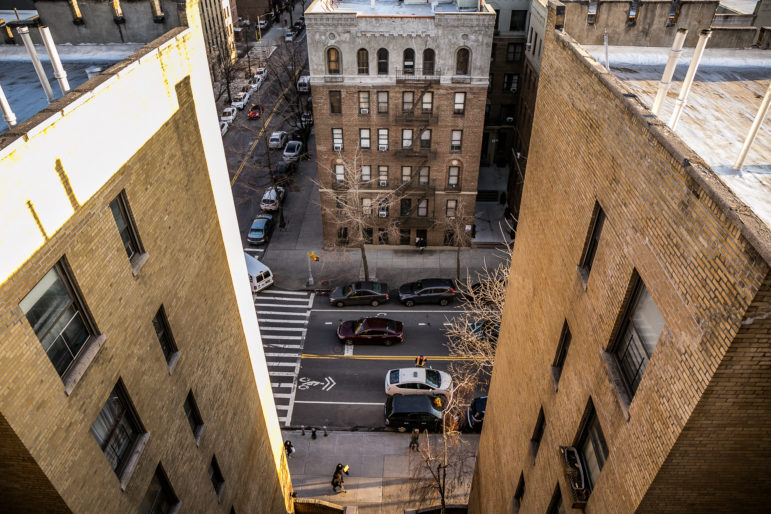Gov. Hochul has proposed expanding an initiative that freezes rent for senior and disabled tenants in exchange for property tax relief. But the program has a low uptake rate, and stagnant enrollment. Can the state get tenants to use it?
Apartment buildings in Manhattan. (Adi Talwar/City Limits)
Rarely are tenants, landlords, legislators, and executives all in agreement. But in New York State, they appear to be on the same page when it comes to freezing the rent for low income seniors and people with disabilities.
In her State of the State address last month, Gov. Kathy Hochul proposed expanding a lesser-known program that freezes the rent for seniors or people with disabilities who have low incomes. The lost rent increases are offset by a property tax credit for landlords.
Not to be confused with Mayor Zohran Mamdani’s promised rent freeze for all rent stabilized tenants, the Senior and Disability Rent Increase Exemptions (known as SCRIE and DRIE, respectively) are targeted to eligible households with incomes below $50,000.
Now the governor wants to raise eligibility to $75,000. But supporters of the program say that won’t be enough: the city needs more to get people to actually use the exemptions. “Many, many people who are eligible are not aware of them… and don’t apply,” said New York State Senate Housing Chair Brian Kavanagh.
A 2025 report from the city’s Department of Finance estimated that just 42 percent of households eligible for the program were using it in 2023, down from 56 percent in 2019.
Total enrollment fell from 75,000 recipients in 2019 to 68,000 in 2024, despite DOF’s estimates that there were more eligible households. Participants have to be living in rent-regulated apartments and pay more than 30 percent of their income in rent to be eligible for the freeze. The report notes that utilization rates have gone down in part because buildings owners reported more rent stabilized units to the state.
Kavanagh helped put together a package of bills in the New York State Senate that would tie SCRIE and DRIE eligibility to inflation, ensure no tenant in the program pays more than 30 percent of their income in rent, and require notice be sent to all eligible tenants.
While Hochul backs raising the eligibility cap to $75,000, she would not say if she supports the suite of bills that supporters say are critical to getting the program to work.
“Governor Hochul will review any legislation that passes both houses of the legislature,” a spokesperson said in a statement to City Limits.
Barbara Collins, a senior who lives in a Mitchell-Lama apartment, said that she was pushed just out of eligibility range because the city’s formula counts her Medicaid premiums as income. In addition to raising the income threshold and tying it to inflation, Collins called for excluding those premiums in income calculations.
“This is crazy. It’s so hard for seniors in New York City,” said Collins, who has also been pushing lawmakers to help seniors better understand the program’s complicated application.
Even if officials vote to raise the income threshold, advocates worry that having a hard cap on eligibility might kick tenants off the program later on as they get cost of living adjustments.
“Without tying the income threshold to cost of living adjustments for seniors and folks with disabilities, this will be a temporary fix,” said Genesis Aquino, executive director at Tenants & Neighbors. “Tenants will continue to lose eligibility every year as rents and basic expenses rise, and the state will be back here again while more low-income people are pushed toward displacement.”
Landlord groups like the New York Apartment Association also support expanding eligibility. CEO Kenny Burgos said that his group tries to educate landlords about the program but thinks the city can do more to reach tenants who may be eligible.
His group opposes the broader rent-stabilized rent freeze that Mamdani championed as part of his affordability-focused election campaign. But it supports the SCRIE and DRIE programs in large part because they offset the costs of rent freezes with property tax credits.
“We’re supportive of it because this is a policy that actually tackles affordability and doesn’t defund buildings,” said Burgos.
Burgos said that rent freezes without accounting for increased costs to landlords lead to distress in rent stabilized properties. Tenant advocates, on the other hand, have argued that a 12 percent rent increase under former Mayor Eric Adams pushed vulnerable households out of the city.
Mamdani presenting his preliminary city budget on Tuesday, where he floated the possibility of a property tax hike. (Ed Reed/Mayoral Photography Office)
Since SCRIE and DRIE actually take property tax revenues off the city’s roll, it won’t help with what Mamdani is calling a “fiscal crisis” in New York City. The mayor is trying to plug a $5.5 billion hole in the city’s budget and threatening to increase property taxes by 9.5 percent if he can’t convince Albany to raise taxes on the rich.
The larger rent freeze for tenants in stabilized units looks likelier this week after an Adams administration holdover rent guidelines board member resigned. Mamdani on Wednesday appointed six new members to the nine-person board, which is expected to vote on the next round of rent adjustments later this spring.
But a rent freeze, and the existing SCRIE or DRIE benefit, only does so much to help elderly or disabled renters on fixed incomes who are already rent-burdened.
“I want to make sure that I am not forced to go into my savings. Because right now, I’m paying 78 percent of my income in rent,” said Fitzroy Christian, a tenant in his 80s living in the Bronx. “I have not much left for [electricity] and my groceries.”
Even freezing his rent at that price, he added, “is not a true benefit.”
One of the bills on the table in Albany this session would not just prevent rent increases for SCRIE and DRIE recipients, but lower their rent to 30 percent of their income (while still offsetting the cost through property tax credits).
Such a policy would lower the rent burden for elderly and disabled tenants even under a promised citywide rent stabilized rent freeze. “We have many tenants in rent stabilized housing taking 40 or 50 percent of their income in rent,” said Kavanagh.
Supporters think that the common sense changes will help enrollment. But they’re also calling for better outreach efforts so tenants can learn about the program. Elderly and disabled folks, who may be more likely to be at home, might be harder to reach. One bill would send a mailer to every eligible tenant.
“Tenants don’t know when and how they can help themselves, and there’s no way for them unless they can afford to hire a very astute tenant landlord lawyer to work for them,” said Collins.
To reach the reporter behind this story, contact Patrick@citylimits.org. To reach the editor, contact Jeanmarie@citylimits.org
Want to republish this story? Find City Limits’ reprint policy here.
The post Hochul Wants to Expand Rent Freezes for Senior & Disabled New Yorkers. Can the State Get Them to Sign Up? appeared first on City Limits.




